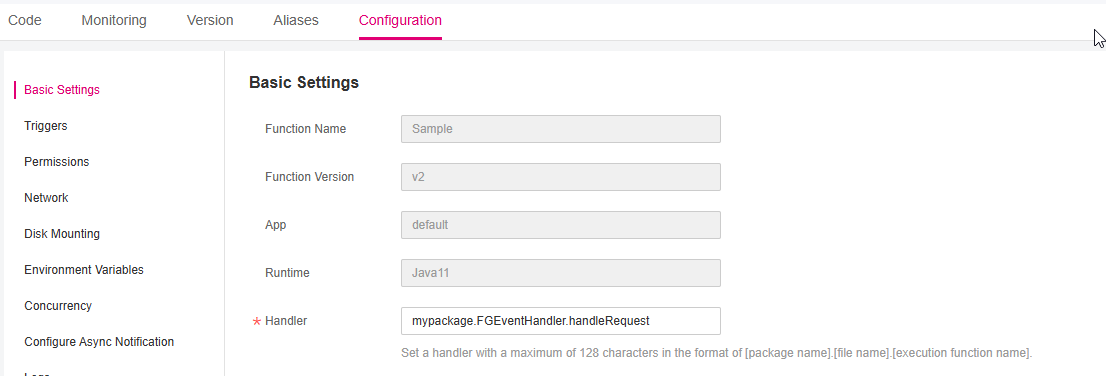Define FunctionGraph function handler in Java¶
Setting up the java handler project¶
A typical Java FunctionGraph project is typically structured as follows:
/project-root
├─ src
| └─ main
| └─ java
| └─ mypackage
| └─ FGEventHandler.java # (contains main handler handleRequest())
| └─ <other_supporting_classes>
└─ pom.xml
The main logic for the function resides in Java file src/main/java/mypackage folder. When deploying to FunctionGraph make sure to specify the correct handler:
[Package name].[Class name].handleRequest
In this example the handler is: mypackage.FGEventHandler.handleRequest.

Example code for Java FunctionGraph function¶
The following example receives an event as a JsonObject.
package mypackage;
import com.google.gson.JsonObject;
import com.opentelekomcloud.services.runtime.Context;
public class FGEventHandler {
public String handleRequest(final JsonObject event, final Context context) {
return "Success";
}
}
Defining and accessing the input event object¶
JSON is the most common and standard input format for FunctionGraph functions. In this example, the function expects an input similar to the following:
{
"id": "aba006fd-d743-4909-959b-7189ee3fad09",
"amount": 290.00,
"item": "Hard disc"
}
Following examples show how to use Java objects as event:
import com.opentelekomcloud.services.runtime.Context;
import com.opentelekomcloud.services.runtime.RuntimeLogger;
public class SampleFG {
public String handleRequest(final SampleFG.EventData event, final Context context) {
RuntimeLogger log = context.getLogger();
log.log(String.format("class name: %s", event.getClass().getName()));
log.log(String.format("key: %s", event.getKey()));
return "ok";
}
public class EventData {
String id;
double amount;
String item;
public EventData() {
}
public String getId(){
return this.id;
}
public void setId(String value){
this.id=value;
}
public String getId(){
return this.id;
}
public void setAmount(double value){
this.amount=value;
}
public double getAmount(){
return this.amount;
}
public String getItem(){
return this.item;
}
public void setItem(String value){
this.item=value;
}
}
}
To use Lombok, you will need to setup maven for Lombok
import com.opentelekomcloud.services.runtime.Context;
import com.opentelekomcloud.services.runtime.RuntimeLogger;
import com.google.gson.annotations.SerializedName;
import lombok.Data;
import lombok.NoArgsConstructor;
import lombok.ToString;
public class SampleFG {
public String handleRequest(final SampleFG.EventData event, final Context context) {
RuntimeLogger log = context.getLogger();
log.log(String.format("class name: %s", event.getClass().getName()));
log.log(String.format("key: %s", event.getKey()));
return "ok";
}
@Data
@ToString(includeFieldNames=true)
@NoArgsConstructor
public class EventData {
@SerializedName("id")
String id;
@SerializedName("amount")
double amount;
@SerializedName("item")
String item;
}
}
This object matches the expected input data. After you define your object, you can write a handler signature that takes in a JSON input that conforms to the record definition. The Java runtime automatically deserializes this JSON into a Java object and the fields of the object can be accessed.
For example, event.getId() retrieves the value of Id from the
original input.
OpenTelekomCloud Trigger Events¶
For events sent by OpenTelekomCloud services, see Event Types of OpenTelekomCloud services.
Accessing and using the FunctionGraph context object¶
The Context interface allows functions to obtain the function execution context, such as information about the invocation, function, execution environment, and so on.
The context is of type com.opentelekomcloud.services.runtime.Context
and is the second argument of the handler function.
To produce logs in OpenTelekomCloud Log Tank Servics (LTS) you can use
context.getLogger() to get a RuntimeLogger object for logging.
context.getLogger().log("Hello world!");
Besides of logging, you can also use the context object for function monitoring. For more information about the context object, see Using the FunctionGraph context object to retrieve Java function information.
Accessing environment variables¶
Environment variables defined in OpenTelekomCloud ->
Configuration -> Environment Variables can be accessed using:
// accessing an environment variable named "ENV_VAR1"
context.getUserData("ENV_VAR1");